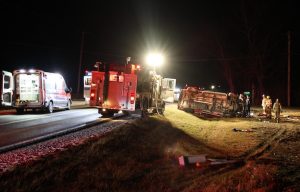Locals react to state pension reform law
Last Tuesday afternoon, the Illinois General Assembly approved an overhaul of the state government worker pension system.
The House of Representatives voted 62-53 to approve the measure, and the Senate also narrowly approved the measure 30-24.
Gov. Pat Quinn signed the bill into law on Dec. 5, and it will take effect June 1, 2014.
Illinois currently has a pension debt of $100 billion, and this measure was passed in the hopes of reducing that debt.
The bill pushes back the retirement age for workers ages 45 and younger on a sliding scale. The annual 3 percent cost-of-living increases for retirees are being replaced with a system that only provides increases on a portion of benefits, based on how many years a beneficiary was in their job. Some workers have the option of freezing their pension and starting a 401(k)-style defined contribution plan. Workers will contribute 1 percent less to their own retirement under the measure.
The bill has been “strongly opposed” by employee unions who are not as agreeable to the method of requiring workers to retire later and reducing and skipping cost-of-living increases.
Several unions have vowed to take legal action in lieu of the decision, saying parts of the bill are unconstitutional and unfair to workers.
Statewide, this measure will have an effect on several systems and hundreds of employees, including prison workers, teachers and professors.
Columbia School Superintendent Dr. Gina Segobiano said she believes some type of pension reform bill was inevitable.
She attributes the need for a bill like this one to the state of Illinois and the state’s failure to pay the required contribution to the retirement system over the years.
“It would be nice if the General Assembly (who approved spending tax dollars in other areas instead of paying the pension obligation) would at least accept responsibility for this shortfall that led to the need for pension reform and communicate this accurately to the public,” she said.
Segobiano said she is glad the General Assembly did not approve the cost shift of increasing the school district’s Teachers Retirement System contributions to offset the state’s contribution.
“To have an additional burden of paying more toward the pension system would be extremely problematic when being charged to balance a budget and effectively operate a school district,” Segobiano said.
Waterloo School Superintendent Jim Helton said he’s worried about younger educational staff who will face reduced benefits and have to work longer before they can draw a pension.
“During the 1970 Constitutional Convention, the delegates inserted language that guaranteed the pension benefits could be neither ‘diminished or impaired.’ So much for the Constitution,” he said. “(Last week), the General Assembly approved and governor signed into law exactly what the 1970 Constitutional Convention was concerned about.”
Helton is also concerned with the quality of education once this bill takes effect.
“As the discrepancy continuously grows between districts with regards to educational funding due to the amount of local dollars generated, one’s zip code largely determines the quality of education,” he said. “Will high quality teachers and administrators remain in the profession?”
Helton said the Waterloo school district is “overburdened with state mandates, disconnected compliance, and critical timelines,” and he is worried about who will remain.
Waterloo High School teacher Richard McDermott, who serves as president of the Waterloo Classroom Teachers Association, said the organization as a whole understands that compromises have to be made in order to stabilize the state’s finances, which in turn help stabilize the district’s finances.
“While many of the provisions in the new legislation are reasonable, some are not, such as raising the retirement age by five years for our younger teachers,” he said. “The WCTA expects that many of the provisions in this legislation will be found to be unconstitutional.”
Kevin Hirsch of Fults has worked 30 years as a correctional officer at Menard Correctional Center, the last 25 as a correctional sergeant. He currently serves as union president for correctional employees at Menard.
Hirsch also said the pension reform deal approved last week violates the state constitution.
“This is about union-busting,” he said. “It is weakening and diminishing the work of public service employees in Illinois.”
Hirsch said he expects the pension reform measure to face a lengthy court battle.
State Senator Dave Luechtefeld (R-Okawville), who represents the 58th legislative district, said he did not support the contents of Senate Bill 1 because he questions the constitutionality of the measure.
In a letter on his website Dec. 6, the day after the bill was passed, he said the bill would likely be challenged in the court system.






